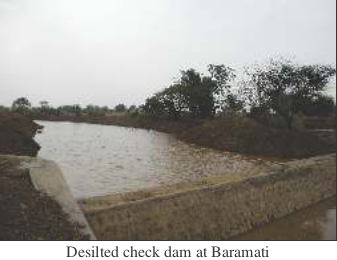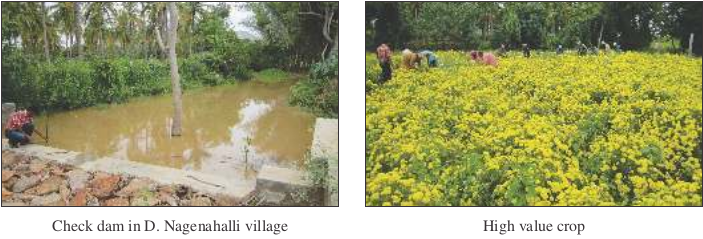Check dam - storing excess-runoff in streams
Check dam - storing excess-runoff in streams
Climate vulnerability
Drought
Existing practice
Some of the structures in villages were not robust enough to withstand recurrent heavy rainfall and flash floods. The design used was probably not appropriate in the face of more extreme weather events which are expected to be more frequent and intense as a result of climate variability in the region. Accordingly, renovation and upgrading of these structures was included under NICRA project activities to enhance the resilience of the communities to current and future climate risks.
Resilient practice / technology
Ex-situ storage of water in seasonal streams at suitable sites is an important strategy to conserve excess runoff water in different rainfall zones. Often, by virtue of the location with reference to nearby hilly areas, the village may receive copious amounts of surface runoff from surrounding areas. This excess runoff could be harvested on streams either for direct use or for improving the ground water availability. In high rainfall areas, though runoff availability is high, often it gets lost due to non-availability of storage structures. In these regions, on-stream storage structures could be built on first order streams to make water available for direct use during long dry spells by farmers. In majority of NICRA villages, check dams (new/desilting of existing ones) were major interventions in drought prone districts in different rainfall zones.
Jalgaon village in Baramati, does not have much runoff from agricultural fields as the rainfall is 550 mm. The village survey indicated two major streams surrounding the village indicating surface inflows from upper catchment areas. Six structures constructed on the streams were not sufficiently catering to the needs due to siltation. One of the major activities carried out over two years is to completely desilt these structures.

Similarly, five new check dams were constructed in the D. Nagenahalli village of Tumkur 3 district, Karnataka. The total water storage capacity increased to 5300 m . Eleven farmers got benefited from this intervention. Apart from this, eight check dams were desilted and widened with additional water storage capacity of 12000 m3.
Impact of check dam after desilting
At Jalgaon, Baramati, desilting resulted in increasing the total capacity of storage from 47750 m3 to 165200 m3. This benefitted in recharging of 96 wells located in the vicinity of these structures. The total area brought under cropping in kharif and rabi seasons due to this storage is about 49 ha and 240 ha, respectively and 27 ha in the summer season.
- Increased water storage capacity of the check dams by 40%. The storage capacity of these 6 check dams increased by 150000 m3.
- 35 farmers transported it to their uncultivable barren fields covering 25.8 ha
- The silt application made barren lands cultivable and resulted in increase in grain yield of pearl millet and rabi sorghum by 5 and 8.75 q/ha, respectively.
- 86 open wells were recharged in the village and water level rose by 7 to 10 feet.
- Provided protective irrigation to crops in 56.4 ha in kharif and 34.5 ha in rabi in an area which was predominantly rainfed earlier, prior to the intervention.
Desilting of five existing check dams was taken up in Chamaluru village of Anantpur, Andhra Pradesh. This activity resulted in increasing the total capacity of storage from 1150 m3 to 2922 m3.
- About 6-8 bore wells are located in the premises of check dams.
- Ground water table increased by 2-3 meters and discharge increased by 1⁄2 inch.
Similarly, at D. Nagenahalli village of Tumkur
- 7 open wells and 5 bore wells were recharged.
- Crop diversification from coarse cereals to vegetables/flowers was observed in few cases
- The yield of Chrysanthemum was 2.2 tonnes/ha. The farmer realized an additional income Rs. 48,000 during 2012-13.
At Boring thanda village, Nalgonda district of Telangana, two new check dams were constructed in addition to desilting and renovation of two existing check dams. A total of 13607 m3 of storage capacity was created.
- Groundwater recharging of 15 open wells and 13 bore wells benefitted 39 farmers.
- About 35 open wells and 9 bore wells were recharged in surrounding areas, benefiting 99 farmers.

Scope for Upscaling
Central and southern India under IWMP
Source: Smart practices and Technologies for Climate Resilient Agriculture
অকোনবা শেমদোকখিবা : 2/12/2020
This topic provides information about Drought tole...
This topic provides information about Community ta...
This topic provides information about Crop diversi...
This topic defines about the Enhancing resilience ...
